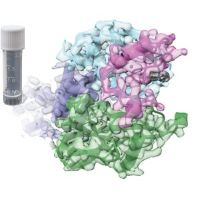Specification
| Description | Recombinant protein from the full-length sequence of Homo sapiens tyrosine 3-monooxygenase/tryptophan 5-monooxygenase activation protein theta (YWHAQ) (NM_006826). |
| Organism | Homo sapiens (Human) |
| Expression Host | Human Cells |
| Tag Info | His or DYKDDDDK. Please contact us if you need further information or require specific designed tag. |
| Purity | Greater than 90% by SDS-PAGE gel |
| Uniprot ID | P27348 |
| Entry Name | 1433T_HUMAN |
| Gene Names | YWHAQ |
| Alternative Gene Names | |
| Alternative Protein Names | 14-3-3 protein theta (14-3-3 protein T-cell) (14-3-3 protein tau) (Protein HS1) |
| Application | Antigens, Western, ELISA and other in vitro binding or in vivo functional assays, and protein-protein interaction studies; For research & development use only! |
| Buffer | Purified protein formulated in a sterile solution of PBS buffer, pH7.2, without any preservatives |
| Endotoxin | Endotoxin level is < 0.1 ng/µg of protein (<1EU /µg) |
| Length | 245 |
| Molecular Weight(Da) | 27764 |
| Protein Sequence | (The sequence of expressed protein may have some variation from the sequence shown below. Please contact us for the exact sequence.) MEKTELIQKAKLAEQAERYDDMATCMKAVTEQGAELSNEERNLLSVAYKNVVGGRRSAWRVISSIEQKTDTSDKKLQLIKDYREKVESELRSICTTVLELLDKYLIANATNPESKVFYLKMKGDYFRYLAEVACGDDRKQTIDNSQGAYQEAFDISKKEMQPTHPIRLGLALNFSVFYYEILNNPELACTLAKTAFDEAIAELDTLNEDSYKDSTLIMQLLRDNLTLWTSDSAGEECDAAEGAEN |
Background
| Function | FUNCTION: Adapter protein implicated in the regulation of a large spectrum of both general and specialized signaling pathways. Binds to a large number of partners, usually by recognition of a phosphoserine or phosphothreonine motif. Binding generally results in the modulation of the activity of the binding partner. Negatively regulates the kinase activity of PDPK1. {ECO:0000269|PubMed:12177059}. |
| Pathway | |
| Protein Families | 14-3-3 family |
| Tissue Specificity | Abundantly expressed in brain, heart and pancreas, and at lower levels in kidney and placenta. Up-regulated in the lumbar spinal cord from patients with sporadic amyotrophic lateral sclerosis (ALS) compared with controls, with highest levels of expression in individuals with predominant lower motor neuron involvement. {ECO:0000269|PubMed:11080204}. |
QC Data
| Note | Please contact us for QC Data |
| Product Image (Reference Only) |  |

